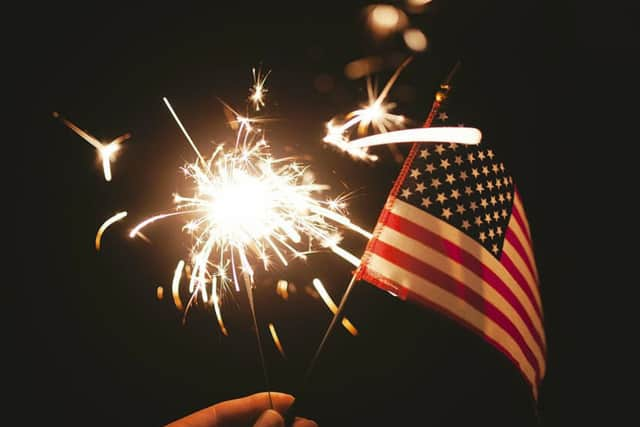Why do Americans celebrate the 4th of July? Independence Day origins and fireworks explained


Here in Scotland the fourth of July is just another Tuesday, but across the transatlantic pond revellers in the United States will observe one of their most significant holidays; Independence Day. It commemorates the approval of the Declaration of Independence in the United States by the Continental Congress on July 4, 1776.
As a federal holiday, it means all non-essential federal government offices will be closed and federal employees are paid for the day off, offering US citizens an opportunity to reflect on their gratitude for their country and celebrate it. Celebrations include carnivals, family reunions, barbecues and - most famously - a lot of fireworks which are central to Fourth of July activities.
Advertisement
Hide AdAdvertisement
Hide AdMuch like our Guy Fawkes Night, however, these fireworks aren’t just for show and in fact the tradition dates back to 1776.
Here is everything you need to know about Independence Day and the history and traditions behind the fourth of July celebration.


What is the meaning of the Fourth of July?
Independence Day always falls on the Fourth of July. It has served as a United States federal holiday since 1941 according to the Economic Times but the origins of the celebration date back to the 18th century when the American Revolution was in full swing.
On July 2, 1776, the Continental Congress voted in favour of Independence from Great Britain and King George III, and two days later the delegates from their thirteen colonies adopted the Declaration of Independence (drafted by Thomas Jefferson) hence leading to the creation of the United States.
Since then, the date has been observed as the ‘birth’ of Independence in the USA with festivities like family gatherings, barbecues, parades and fireworks being prominent.


When did fireworks become popular for Independence Day?
In a letter to his wife Abigail in 1776, the to-be president of the United States, John Adams, wrote that he imagined a sparkling sky that would commemorate the soon-to-be thirteen independent colonies under British rule.
According to the National Archives, on July 3, 1776, Adams - who became the second president - wrote:
"I am apt to believe that it will be celebrated, by succeeding Generations, as the great anniversary Festival.
Advertisement
Hide AdAdvertisement
Hide Ad"It ought to be solemnised with Pomp and Parade, with Shews, Games, Sports, Guns, Bells, Bonfires and Illuminations from one End of this Continent to the other from this Time forward forever more.”
A day later, the Declaration of Independence was adopted. Thereafter, the History Channel reports that “Adams’s hometown of Boston saw its own fireworks display that July 4th, as Colonel Thomas Crafts of the Sons of Liberty took the opportunity to set off fireworks and shells over Boston Common.
“In the years to come, various cities continued the tradition of celebrating independence, holding picnics, parades, speeches and fireworks displays for the occasion, though Boston was the first to designate July 4 an official holiday.”
Fireworks were originally called “rockets” but reportedly got their name during the first official Fourth of July celebration in 1777 where it was said to symbolise the “bombs bursting in air”. This phrase was used in the Star-spangled Banner in 1814.
Why do Americans celebrate the Declaration of Independence?
We know that July 4th is important to Americans as it’s considered the nation’s birthday. The day that the Declaration of Independence was adopted, seeing the British colonies liberated. Although isn’t there more to it than that?
For many Americans, the real significance of this date is the Declaration itself and its ‘eternal truths’ that withstand the test of time. The Washington Examiner says its ‘trans-historical’ appeal “was not to any conventional law or political contract but to the equal rights possessed by all men and "the separate and equal station to which the Laws of Nature and nature’s God" entitled them.
“What is revolutionary about the Declaration of Independence is not that a particular group of Americans declared their independence under particular circumstances but that they did so by appealing to — and promising to base their particular government on — a universal standard of justice.”
The document reads:
“When in the Course of human events, it becomes necessary for one people to dissolve the political bands which have connected them with another, and to assume among the powers of the earth, the separate and equal station to which the Laws of Nature and of Nature’s God entitle them, a decent respect to the opinions of mankind requires that they should declare the causes which impel them to the separation. We hold these truths to be self-evident, that all men are created equal, that they are endowed by their Creator with certain unalienable Rights, that among these are Life, Liberty and the pursuit of Happiness.—That to secure these rights, Governments are instituted among Men, deriving their just powers from the consent of the governed, —That whenever any Form of Government becomes destructive of these ends, it is the Right of the People to alter or to abolish it, and to institute new Government, laying its foundation on such principles and organising its powers in such form, as to them shall seem most likely to effect their Safety and Happiness. Prudence, indeed, will dictate that Governments long established should not be changed for light and transient causes; and accordingly all experience hath shewn, that mankind are more disposed to suffer, while evils are sufferable, than to right themselves by abolishing the forms to which they are accustomed. But when a long train of abuses and usurpations, pursuing invariably the same Object evinces a design to reduce them under absolute Despotism, it is their right, it is their duty, to throw off such Government, and to provide new Guards for their future security.”
While the document served to address the misdeeds of the British, it speaks to the ‘unalienable rights of life, liberty and property’ that mankind should be born with. Declaring that governments do not grant us these rights but rather exist to protect them and to do otherwise would be tyrannical.
To this day, the sentiment rings true for many hence why the document is seen as ‘eternal’ and pivotal to civil liberty.
Comments
Want to join the conversation? Please or to comment on this article.
